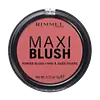What's inside
What's inside
 Key Ingredients
Key Ingredients

 Benefits
Benefits

 Concerns
Concerns

 Ingredients Side-by-side
Ingredients Side-by-side

Talc
AbrasiveSynthetic Fluorphlogopite
Mica
Cosmetic ColorantMagnesium Myristate
Octyldodecyl Stearoyl Stearate
EmollientDiisostearyl Malate
EmollientHydrogenated Polyisobutene
EmollientPhenoxyethanol
PreservativeCaprylyl Glycol
EmollientBenzyl Alcohol
PerfumingHexylene Glycol
EmulsifyingSilica
AbrasiveMaltodextrin
AbsorbentTin Oxide
AbrasiveDehydroacetic Acid
PreservativeWater
Skin ConditioningIron Oxides
CI 77742
Cosmetic ColorantCI 77891
Cosmetic ColorantCI 75470
Cosmetic ColorantCI 15850
Cosmetic ColorantCI 77007
Cosmetic ColorantTalc, Synthetic Fluorphlogopite, Mica, Magnesium Myristate, Octyldodecyl Stearoyl Stearate, Diisostearyl Malate, Hydrogenated Polyisobutene, Phenoxyethanol, Caprylyl Glycol, Benzyl Alcohol, Hexylene Glycol, Silica, Maltodextrin, Tin Oxide, Dehydroacetic Acid, Water, Iron Oxides, CI 77742, CI 77891, CI 75470, CI 15850, CI 77007
Triethylhexanoin
MaskingOctyldodecanol
EmollientSilica
AbrasiveBis-Diglyceryl Polyacyladipate-2
EmollientCaprylic/Capric Triglyceride
MaskingSynthetic Wax
AbrasiveSynthetic Beeswax
Emulsion StabilisingPolyethylene
AbrasiveTriethoxycaprylylsilane
Sorbitan Sesquioleate
EmulsifyingStearalkonium Hectorite
Gel FormingPropylene Carbonate
SolventEthylene/Propylene Copolymer
Abrasive1,2-Hexanediol
Skin ConditioningTocopheryl Acetate
AntioxidantCaprylyl Glycol
EmollientEthylhexylglycerin
Skin ConditioningDimethicone
EmollientPunica Granatum Seed Oil
EmollientCitrullus Lanatus Seed Oil
EmollientRosa Damascena Flower Oil
MaskingCI 77891
Cosmetic ColorantCI 15850
Cosmetic ColorantCI 19140
Cosmetic ColorantCI 77491
Cosmetic ColorantTriethylhexanoin, Octyldodecanol, Silica, Bis-Diglyceryl Polyacyladipate-2, Caprylic/Capric Triglyceride, Synthetic Wax, Synthetic Beeswax, Polyethylene, Triethoxycaprylylsilane, Sorbitan Sesquioleate, Stearalkonium Hectorite, Propylene Carbonate, Ethylene/Propylene Copolymer, 1,2-Hexanediol, Tocopheryl Acetate, Caprylyl Glycol, Ethylhexylglycerin, Dimethicone, Punica Granatum Seed Oil, Citrullus Lanatus Seed Oil, Rosa Damascena Flower Oil, CI 77891, CI 15850, CI 19140, CI 77491
 Reviews
Reviews

Ingredients Explained
These ingredients are found in both products.
Ingredients higher up in an ingredient list are typically present in a larger amount.
Caprylyl Glycol is a humectant and emollient, meaning it attracts and preserves moisture.
It is a common ingredient in many products, especially those designed to hydrate skin. The primary benefits are retaining moisture, skin softening, and promoting a healthy skin barrier.
Though Caprylyl Glycol is an alcohol derived from fatty acids, it is not the kind that can dry out skin.
This ingredient is also used as a preservative to extend the life of products. It has slight antimicrobial properties.
Learn more about Caprylyl GlycolCi 15850 is the pigment color red. It is an azo dye and created synthetically.
Azo dyes need to be thoroughly purified before use. This allows them to be more stable and longer-lasting.
This ingredient is common in foundations, lipsticks, and blushes. This color is described as brown/orangey red.
It has many secondary names such as Red 6 and Red 7. According to a manufacturer, Red 6 usually contains aluminum.
Learn more about CI 15850Ci 77891 is a white pigment from Titanium dioxide. It is naturally found in minerals such as rutile and ilmenite.
It's main function is to add a white color to cosmetics. It can also be mixed with other colors to create different shades.
Ci 77891 is commonly found in sunscreens due to its ability to block UV rays.
Learn more about CI 77891Silica, also known as silicon dioxide, is a naturally occurring mineral. It is used as a fine, spherical, and porous powder in cosmetics.
Though it has exfoliant properties, the function of silica varies depending on the product.
The unique structure of silica enhances the spreadability and adds smoothness, making it a great texture enhancer.
It is also used as an active carrier, emulsifier, and mattifier due to its ability to absorb excess oil.
In some products, tiny microneedles called spicules are made from silica or hydrolyzed sponge. When you rub them in, they lightly polish away dead skin layers and enhance the penetration of active ingredients.
Learn more about Silica